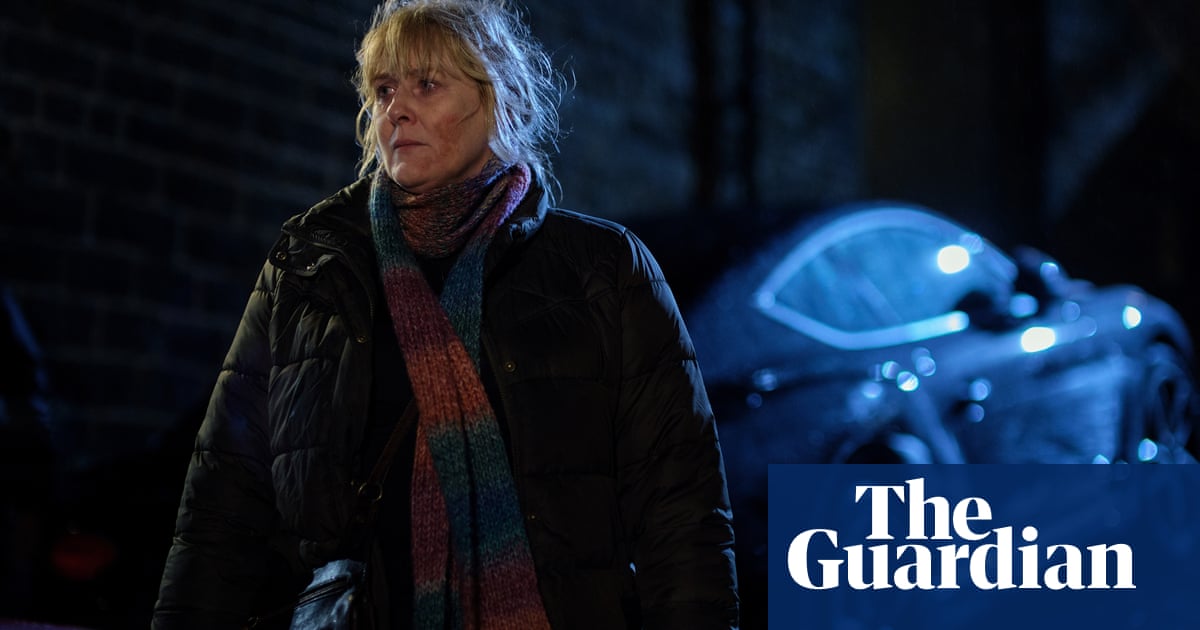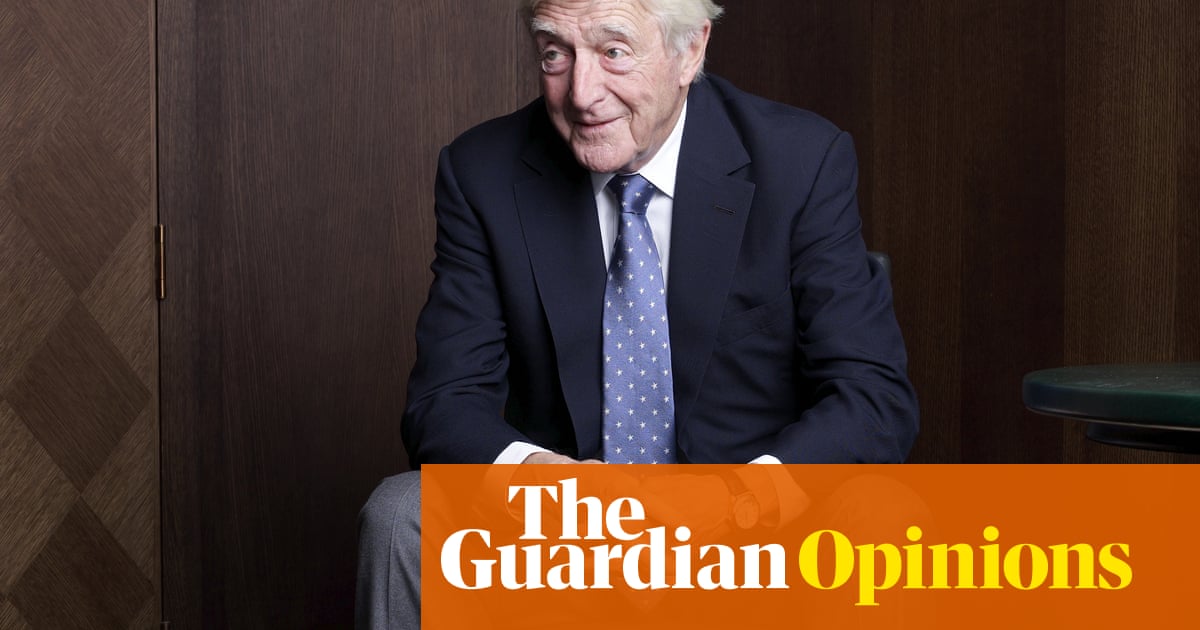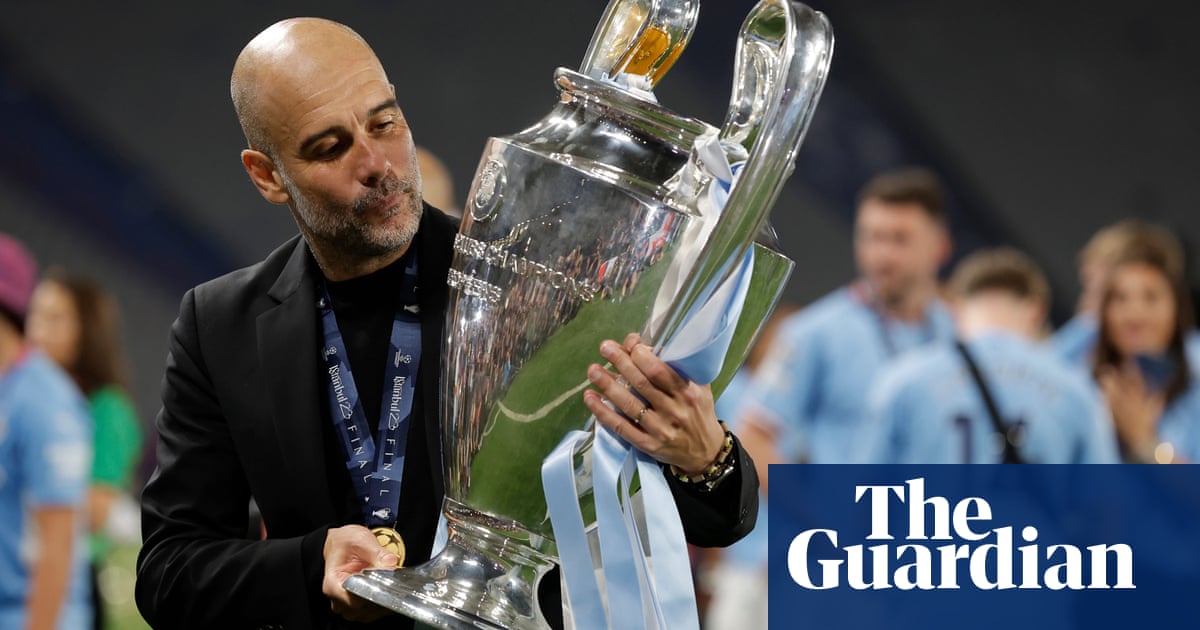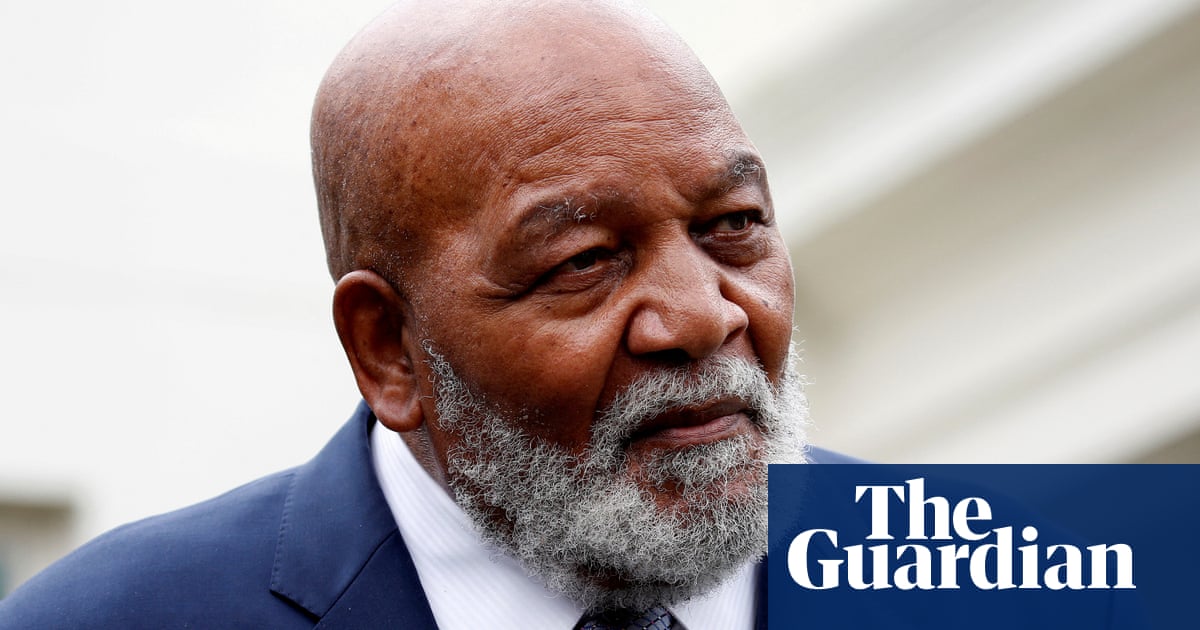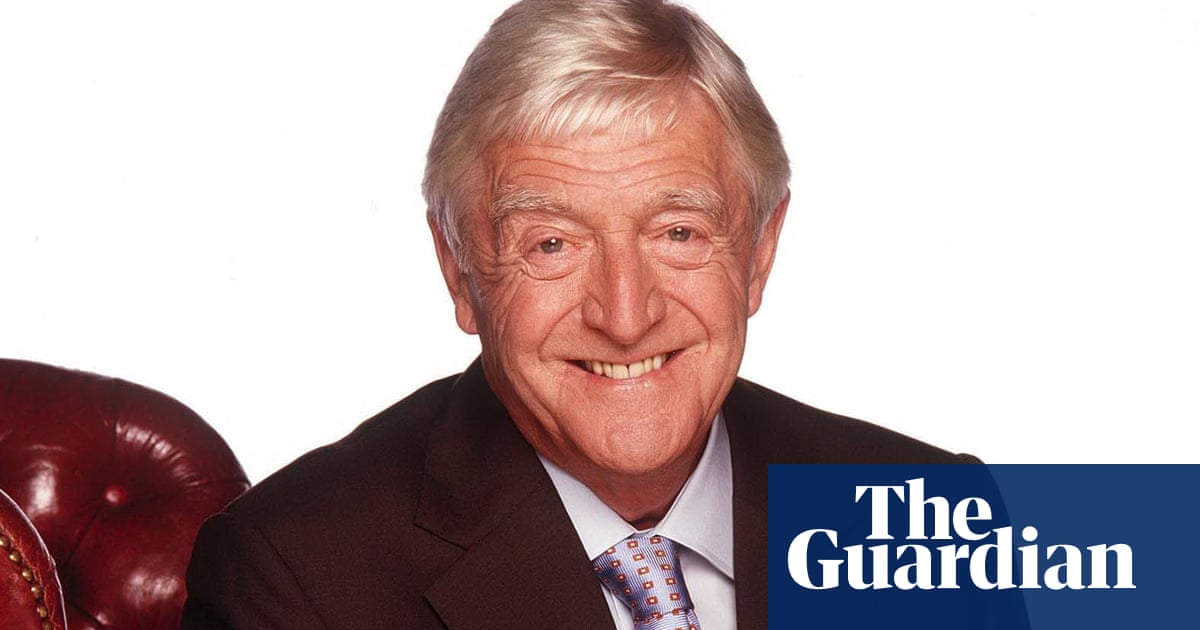
Michael Parkinson’s biggest impact on British television was to stretch the schedules at each end of the day. The broadcaster, who has died at the age of 88, was instrumental in introducing late-night talkshows and breakfast TV to the UK. Although he had starkly different levels of personal success with these previously American formats.
His chatshow – which he hosted in various iterations on BBC and ITV from 1971 to 2007 – saw him create the all-time standout hours of television interviewing: four encounters with boxer Muhammad Ali. It was television so great, its only possible rival was David Frost’s 1977 programmes with the disgraced former US president Richard Nixon. And, coincidentally, the two presenters were also associated during the low point of both their careers: as shareholders in a consortium called TV-am that won the right to launch, from 1983, Britain’s first breakfast television programme: ITV’s Good Morning Britain. It would prove a disaster.
Born in Cudworth, South Yorkshire, in 1935, Parkinson’s childhood ambition was to play county cricket for Yorkshire, which led him to leave school at 16. He was a good enough batsman in local teams to briefly block the selection of the slightly younger Geoffrey Boycott, who went on to become one of Yorkshire and England’s most prolific run-scorers. When Boycott overtook him in ability, and Parkinson’s secondary dream of being a movie star also seemed unattainable, he settled for the profession of journalism.
First working on local papers, he soon moved to the Manchester Guardian and Daily Express, a rise interrupted by being among the last British men to do national military service. He was one of the army’s youngest ever captains, perhaps early evidence of the desire to be in control that’s so crucial for being a television presenter.
Parkinson began seeking screen work at the beginning of the 60s, driven by a love of American culture he’d had since being enthralled in his youth by Hollywood stars of the era. His inspirations included James Stewart, Bob Hope, Lauren Bacall, Katharine Hepburn, Bing Crosby, Jack Lemmon, Charlton Heston and David Niven.
After a first tentative transition to TV as an occasional reporter for the Granada series, Scene At 6.30, Parkinson’s fascination with film led to his biggest early TV gig. He became apresenter on the Granada show Cinema, the other hosts of which include another future journalist turned frontman, Clive James.
Parkinson offered celebrity interviews to Granada, but was rejected. This encouraged him towards the BBC, which also initially resisted his enthusiasm for the American template. The BBC employed him as a reporter on 24 Hours (BBC One, 1965-72), which, as a precursor of the later Newsnight (BBC Two, from 1980), was the BBC’s idea of end-of-day entertainment.
Parky’s dream, though, was to be the “British Carson”. From the early 1950s, presenter Johnny Carson was the master of NBC’s late-night studio-based interview shows with cultural and political celebrities. But studio bosses were worried that the format was not adaptable for a British audience, after failed previous attempts, including David Frost’s own self-casting as an alternative to Carson which foundered due to a sense of over-Americanisation.
Parkinson eventually persuaded sympathetic Atlanticists at the BBC that he would succeed due to his gravitas a journalist. Plus, his Yorkshire accent, striking at the time on a BBC dominated by received pronunciation, also underwrote the promise of substance rather than stardust.
Unlike Carson’s weekly shows, Parkinson was initially restricted to a tryout of some summer Saturdays at 10.30pm, the first edition of Parkinson transmitting on 19 June 1971. The show eschewed Carson’s topical political monologue, impossible under BBC impartiality rules, but copied the use of a live studio band by hiring jazz group (Parkinson’s favourite style of music) the Harry Stoneham Five.
The first show featured tennis player Arthur Ashe, in town to play at Wimbledon, comedy actor Terry-Thomas, and Ray Bellisario, a paparazzo notorious for photographing members of the royal family in situations to which the press had not been invited. Around the interviews, the jazz singer Marion Montgomery began a musical residency that would run over the first two series.
The opening guests reflected tensions in the perception of what the series should be. The BBC, seeing the series as light entertainment, wanted showbiz names, which proved elusive to an unknown franchise. So producer Richard Drewett asked a favour of Terry-Thomas, who had a holiday home near Drewett’s parents. As a newspaper man, Parkinson’s instinct was that the show’s debut needed a talking point the press would follow up on, hence the booking of Bellisario, who appeared in front of a studio audience deliberately packed with monarchists outraged by the snapper’s trade.
While Terry-Thomas specialised in playing very English toffs, the inclusion in the opening lineup of Ashe, who was African American, also seems impressively progressive for its time. By mixing guests from across sport, arts and cinema, the lineup was groundbreaking, as before then, BBC programmes were usually separated by subject.
The just-appointed archbishop of Canterbury, Robert Runcie, appeared in 1980; a recently retired US secretary of state, Henry Kissinger, accepted the invitation twice, and former English lord chancellor Lord Hailsham also sat on a soft leather chair. The Parkinson archive also includes influential writers, including the poet WH Auden, playwrights Ben Travers and Harold Pinter. He sat down authors such as Laurie Lee, Norman Mailer, Gore Vidal and Anthony Burgess, who, cigarillo in mouth, suggested to his visibly blanching interviewer that the dome of St Peter’s Basilica in the Vatican resembled “a great obscene testicle”.
These legislators and intellectuals were dispersed among the Hollywood superstars who were Parkinson’s main focus: the first few seasons alone hosted Orson Welles, Bing Crosby, Michael Caine, Tony Curtis, Bob Hope, Peter Sellers, Lauren Bacall, Richard Burton – a lineup that would have thrilled any US-based station. At a time when an ex-Beatle was media gold, John Lennon guested in 1972, although only if Parkinson wore a sack. (A stipulation, apparently, of Yoko Ono.)
The introduction, in 1969, of the supersonic jet Concorde, which more than halved the length of flights from New York to London, had vastly increased the availability of American stars to UK television, making it feasible to come to England from the states for a day or so. In 1971-72, guests were paid a flat rate of £500 (the equivalent of about £7,000 now), although some negotiated higher fees. Orson Welles, a hero to Parkinson and Drewett for directing Citizen Kane and acting in The Third Man, demanded £2,000 (about £30,000 today) handed over in bank notes at the airport in London.
Crucially, though, superstars were lured to the studio by the knowledge, passed around by word of mouth, that they would get a serious hearing from an interviewer who would be deeply familiar with their work, either from personal immersion or researchers’ briefs. Another essential quality of the programme, encouraged by Drewett, was that, in further contradiction of British TV’s siloed style, guests were inventively mixed and mismatched. Except for intermittent editions where producers or interviewees preferred solo slots, the policy, again American influenced, was that guests entered singly, but then remained, allowing a final group round.
Emblematically, a 1980 episode featured Kojak actor Telly Savalas; Sir John Hackett, a former British army and Nato general, and actor Ingrid Bergman, star of Casablanca, one of the movies that had triggered Parkinson’s passion for Hollywood. Among the ecletic lineups the host himself was most likely to have relished was a 1977 pairing of James Stewart, star of It’s a Wonderful Life and The Philadelphia Story, with Geoffrey Boycott, Yorkshire’s greatest cricketer, at least until the recent career of Joe Root. The football manager Brian Clough and the mime artist Marcel Marceau were another unlikely pairing, even though the Frenchman’s willingness to speak rather than gesture somewhat reduced the surrealism.
Perhaps most startling, though, was a 1972 edition with George Best, the most famous British footballer of the time, alongside poet Sir John Betjeman. That was the rough equivalent now of Marcus Rashford appearing with Carol Ann Duffy, a combo that even Graham Norton (the only one of Parky’s successors to match his talent and impact) would struggle to smuggle on to peak-time BBC One.
The show’s ability to get almost anyone it wanted – singer Frank Sinatra and cricketer Sir Donald Bradman were the only rejections Parky resented – was the result of its impressive past guest list, a standard set by Ali’s first appearance, during the first season in 1971.
Ali proved to be the ideal Parkinson guest. Physically beautiful and radiating power and grace, the boxer magnetically drew viewers’ eyes towards him. Though his formal education was limited, Ali possessed wit, intelligence and verbal fluency possessed by few: a writer’s mind in a fighter’s body. Despite Auden’s and Betjeman’s appearances, the show’s most electrifying poetry recitations were Ali’s freestyle, rhyming verses: on that first appearance, he delivered from memory an epic about his upcoming opponent Joe Frazier.
Including a satellite link-up with the Dick Cavett show in New York (an acknowledgment of the origins of the English series), Ali was a guest four times, though never again as charismatically and lovably as on his debut. In his 2009 autobiography, Parky, noted that Ali arrived for the second recording surrounded by scowling young men, his bodyguards from the Nation of Islam organisation.
Berating miniskirted western women for “walking around with their behinds out”, Ali told the audience there was a “spiritual war” between blacks and whites”. Accusing Parkinson of trick questions (“Behind stage you’re so nice”), he warned: “You and this little TV show are nothing to Muhammad Ali.”
Despite his contentious later appearances, internal BBC research showed that Ali was one of only two guests who automatically added 2 million viewers to the show’s audience. The other was Billy Connolly, whose 15 appearances across various Parky formats gave him the guesting record.
Though sometimes lampooned for the regularity with which he spoke of his time on regional newspapers, that experience was vital to what made Parky a great interviewer. The quick-jab questions that reporters were traditionally taught can unlock the core of any story – who, what, when, where, how and why? – were carried by Parky into his TV star persona. Some of the best answers he drew from Ali, along with sundry politicians and novelists, came from thrusting “Why?” or “How?” into a monologue that was attempting to control the content. Also important was that, when interviewing comedians, he was willing to set up and then get out of the way of their best stories, rather than competing for punchlines himself; a tendency he deprecated in some of the later pretenders to his chair. As with many presenters of his generation, his weakness was flirtatiousness with women guests; Helen Mirren recoiled ata reference to her breasts that Parkinson later admitted was “clumsy”, but can charitably be seen as a rare misstep.
Admirers of Parkinson – and denigrators of his successors – often cited his earlier years as exemplifying a lost time when stars came to TV shows to discuss their life and work rather than plug a product. The host himself was clear-eyed about this; many of the superstars he secured in later years had a film or book out or a show on in London. Ali, before his first appearance, had flown over to promote a soft drink.
Discovering that the itinerary included a trip to a bottling factory in the home counties, producer Drewett cajoled the beverage company into allowing Ali to be diverted to the BBC for what was billed as a “short news interview.” In reality, Parkinson and a studio audience were waiting for the guest, and an hour was recorded. The difference between then and now is that Drewett was able to subvert the PR circuit in this way without legal action.
Impressionists, such as Mike Yarwood, who often graced the Saturday night schedule, had fun with Parkinson’s relative awkwardness as a TV performer, caricaturing his tendency to scratch his hair and his very 70s sideburns, and even sometimes seem perilously close to picking his nose.
By its second series, though, the show had become a schedule fixture for the BBC, although executives tried to nudge it further towards light entertainment and away from the presenter’s self-image as a newsman. This distinction was interestingly signalled by trails, recorded during camera rehearsal and screened early on Saturday evening. In these, Parky revealed that night’s lineup, from his increasingly recognisable black leather chair, wearing slacks and an open-necked-shirt rather than the sharp suit and tie in which he would later open the show. No newsreader or current affairs host would have done this, and the image subliminally acknowledged that host and guests were at some level performing in outfits.
Parkinson soon became a critical hit, except with Clive James, whose first years as Observer TV critic closely coincided with the early series. James, who would later serve among Parky’s ITV predecessors and BBC replacements, wrote reviews that provoked Parky into responding on air. James’s response was to reply in print, in 1975, that “one of the effects of television is to make frontmen over-mighty. It follows that one of the tasks of television is to remind them they are mortal”. But, as James’s fame rose, he accepted an invitation to be a guest on Parkinson, the manner in which TV has often sought to neutralise troublesome reviewers. By the time of Ali’s final appearance in 1981, James was a fan of the franchise. By this stage, there were early signs of the boxer’s neurological condition, Parkinson’s disease, a grim nominal coincidence that makes online searches for footage of the encounters distressingly complex.
If the world heavyweight champion and pioneering rhymester was the zenith of early Parkinson, the nadir was the night in 1976 when Emu, a puppet operated by the comedian Rod Hull, repeatedly attacked the presenter, supposedly humorously. Parky testily threatened to “break the neck” (and, by extension, Hull’s arm) if the bird didn’t back off.
The meetings with Ali and Emu neatly represented the high and low possibilities of the talkshow format, of which the first 11 years of Parkinson remain the outstanding example in the UK. As ratings and reputation rose, the host asserted his long-held desire to run Monday to Friday, as Carson did. A BBC executive was sympathetic, but the board of governors, fearing too much Americanisation and light entertainment on BBC One, resisted. The broadcaster was backed by the National Union of Journalists, which threatened a strike because a nightly Parky would replace Tonight, a news and current affairs show. Questions were raised, including in the House of Commons, about the alleged threat of “endless interviews with Peter Ustinov” replacing war reporting. Spooked, the BBC board refused any spread beyond two shows, with a midweek edition from 1979.
It was not coincidental that a thwarted Parkinson chose this time to expand his career geographically. Unlike Frost, who for many years sustained series on both sides of the Atlantic, Parkinson never broke into the US talk market. But he achieved a parallel career in Australia, which had the advantages, during the English winter, of sun and cricket. Parky made the most of both these benefits while interviewing local figures in a Sydney version of his London show: Parkinson In Australia ran for five long seasons from 1979-83 on ABC and then the commercial network Channel 10.
There were snobby colonialist jokes in the English media about Parky being so short of local celebrity cultural figures he would have to resort to interviewing kangaroos. But, in fact, the Australian version started out more highbrow than English predecessor. The first guest was the great Australian ballet dancer and choreographer Robert Helpmann, who went on to make three appearances across the series, vying for frequency with Bob Hawke, then Labor party leader en route to winning the 1983 election and serving three terms as prime minister. The bookers also made canny use of UK-based stars – Clive James, Germaine Greer, Barry Humphries, Billy Connolly – who visited Australia for family or business reasons.
Parky’s own increasing commercial interests helped to end the Australian spin-off. His experience there, and his career-long observation of Frost, had shown Parkinson a world where front-of-camera talent owned back-of-camera equity and profits, rather than being, as at the BBC, a salaried employee.
Blocked by the BBC board from dominating the night-time TV schedule, Parkinson switched to the objective of monopolising mornings, accepting Frost’s invitation to join a consortium bidding for the first British breakfast franchise, on ITV.
In a TV culture where public service still just about held sway, contracts could be won by creative credentials rather than just the highest bidder. This was crucial to what went wrong. Frost cannily gathered broadly upmarket hosts – himself, Parky, Anna Ford, Robert Kee, Angela Rippon – who made TV regulators swoon, but who morning viewers found a tough chew with their toast.
Off-screen hirings exacerbated the mismatch. Parkinson, never unwilling to be a class warrior, complained that Good Morning Britain was staffed by young Oxbridge graduates “who could have parsed a Latin poem for you but couldn’t write a TV running order to save their lives”. (Some of these unworldly interns later became senior leaders at the BBC.)
A further calamity was that the supposedly non-commercially competitive BBC responded by creating its own morning sofa show, Breakfast Time, forcing TV-am to bring its scheduled debut forward by six months, but still being beaten to air by its rival. It was widely theorised that the BBC’s desire to take the commercial broadcaster down was motivated by the fact that several of TV-am’s founders – in addition to luring Parkinson and Rippon, ITV also lured Esther Rantzen, who later changed her mind – had left the corporation with the potential to achieve the sort of income and equity BBC lifers could only envy.
However, TV-am did not thrive. Able to move easily between hard news and soft chat, Parkinson fared better in reviews and viewer focus groups than Ford, Frost and Kee, who were judged to be too Open University. Ratings plummeted, and, amid recurrent reshuffles on air and in the boardroom, Parkinson was shifted to weekends. He wound up co-hosting a show with his wife, Mary (an accomplished broadcaster for ITV), which set the template for future couple presenting duos, such as Richard Madeley and Judy Finnigan, and Eamonn Holmes and Ruth Langsford.
Almost all of TV-am’s original stars were gone by 1984. ExtendingParkinson’s bad luck with puppets, the station was saved by children’s entertainer Roland Rat , and introduced to a range of younger talent including Nick Owen and Anne Diamond who, in a small legacy for the Parkinsons, any viewers assumed were a couple (although they weren’t). Another consolation was that Parkinson’s TV-am shares ultimately proved lucrative.
There followed a decade and a half that media journalists sometimes (debatably) called Parky’s “wilderness years”. It’s true that only one project in this period made use of his primary televisual skill – Parkinson One to One (ITV, 1987-88). Parky’s second British talkshow was produced, with considerable autobiographical significance, by Yorkshire TV. These 47-minute (the commercial TV hour) chats included Elton John, Cliff Richard and, inevitably, Billy Connolly, although casting all 15 shows with white men illustrated the extent to which his precociously diverse first show had been helped by its focus on American figures.
Elsewhere, though, the presenter remained visibly busy, hosting Give Us a Clue on ITV from 1984 to 1992, a gameshow version of charades; and Going for a Song on BBC One from 1995 to – 99, a quizshow about antiques. Essentially, more likely through hiring opportunities than desire, he was moving both feet into light entertainment.
But this lighter style of TV brought his darkest moment: Ghostwatch (BBC, 1992) was a horror drama written by Stephen Volk, using the form of a mock live broadcast, co-hosted by Parkinson, from a reputedly haunted house. In one scene, Parkinson himself appeared to became possessed by a spirit, a moment so unlikely that it might have been seen to emphasise the fictional nature of the show.
However, a teenage viewer with learning disabilities subsequently killed himself, leaving a note that seemed to attribute his distress to having taken the transmission for reality. The broadcasting regulator ruled that the BBC should have labelled the show clearly as fiction, rejecting the defence that this would have ruined its impact as a mockumentary. Parkinson, who had no influence on the form or promotion of the show, was not held personally responsible in any way, but the incident helped to encourage the view that he was making do with lesser projects than in his heyday.
During this second act of his public career, he also resumed coverage of sport, for the Sunday Times, Daily Telegraph and BBC Radio 5 Live. Parkinson’s view of sport was, like his enthusiasm for movies, inherently nostalgic. Sidney “Skinner” Normanton, a coalminer and hard-tackling “wing-half” (itself a forgotten position) for Barnsley FC from 1947-54, was always his benchmark for sporting authenticity. His other perfect subject was Ali, who Parkinson showed a special insight into when writing about the boxer’s long decline until his death in 2016.
Some best of compilations from his chatshow’s 1971-82 run led to a second BBC One series of Parkinson, on Saturday nights, from January 1998. The first return show featured regular guest Connolly, but the guest list was later refreshed by Hollywood stars such as Madonna and Will Smith. George Michael also appeared, giving his substantial interview since he was arrested in 1998 by vice police in a public lavatory in Los Angeles, giving Parkinson another news scoop. His comeback wasn’t flawless, though as athere was another Mirren-like mishap, in 2003, when Meg Ryan cut short an excruciatingly awkward interview about her erotic thriller In The Cut.
After six successful years, the presenter fell out with the network again, with a disagreement over moving his show to a later start time to accommodate the return of Match of the Day (ITV had briefly poached football) to BBC One. Perhaps finding football stars of that time to lack the standards of Skinner Normanton, Parky transferred himself to the Saturday night ITV slot just vacated by the football.
On this ITV incarnation of Parkinson (2004 to 2007), the host who had started his career talking to stars decades older than him now had a similar age-gap with newer guests such as Lewis Hamilton, David Cameron and Tony Blair. Blair gave the ex-reporter, then almost 70 years old, his last front page splash when he suggested that the posthumous judgment of God mattered at least as much to him as the views of voters and the media. To Parkinson’s credit, the revelation was extracted because he picked up on rather ambiguous references to “judgment” and “faith” in an answer that Blair – who had been warned against “doing God” by his press secretary, Alastair Campbell – was trying to keep vague. The final guest on ITV – and of Parkinson’s chatshow career, was, almost inevitably, Connolly, the only person to have appeared in all the English and Australian iterations of the franchise.
Parky was arguably always, at some level, an under-the-radar arts presenter, and he went on to embrace the category officially by hosting Parkinson: Masterclass (Sky Arts, 2012-14), in which guests including actor Simon Russell Beale and dancer Akram Khan explained their craft.
In 2021, the BBC marked a the anniversary of the original series with Parkinson At 50, in which the presenter picked his favourite BBC moments. Inevitably, the encounters with Ali stood out. The boxer told the interviewer how important it was for him to be remembered as “the greatest”. Michael Parkinson never demanded that title for himself among British talkshow hosts, but he certainly earned it and is unlikely ever to be defeated.




